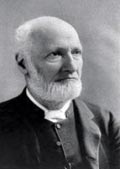the Third Week after Easter
Click here to learn more!
Bible Commentaries
Schaff's Popular Commentary on the New Testament Schaff's NT Commentary
Old Testament
Philip Schaff (1819-1893) was a Swiss-born, German-educated theologian and ecclesiastical historian whose work and influence crossed oceans and denominations. Emigrating to the United States in 1844, Schaff made profound contributions to American religious life, significantly impacting theological education, ecumenism, and church history studies. His scholarly journey began with his education at the University of Berlin, where he was influenced by figures like August Neander and Friedrich Schleiermacher, leading lights of the 19th-century German theological scene.
Schaff's career in the United States was marked by an enduring commitment to the unity of Christian denominations. He advocated for a "catholic" (universal) Christianity that transcended denominational lines, a vision that was both ahead of its time and deeply rooted in the early Christian tradition. This ecumenical spirit informed much of his work, including his role in the American Bible Revision Committee, which produced the American Standard Version of the Bible.
Perhaps Schaff's most enduring legacy is his editorial work on the "Schaff-Herzog Encyclopedia of Religious Knowledge," an exhaustive reference work that remains a valuable resource for theologians and historians. However, his magnum opus is the multi-volume "History of the Christian Church," a comprehensive work that chronicles the development of Christianity from the apostolic age to the Reformation. This monumental work showcases Schaff's meticulous scholarship, his passion for the unity of the church, and his profound respect for Christian history and doctrine.
Philip Schaff's contributions to theology and church history reflect his deep faith, intellectual rigor, and a visionary belief in the unity of God's people. His works continue to inspire and inform scholars, pastors, and laypeople, serving as a bridge between different Christian traditions and historical epochs. Schaff's life and work embody a remarkable blend of academic excellence and ecumenical commitment, marking him as one of the most influential figures in 19th-century American Christianity.
